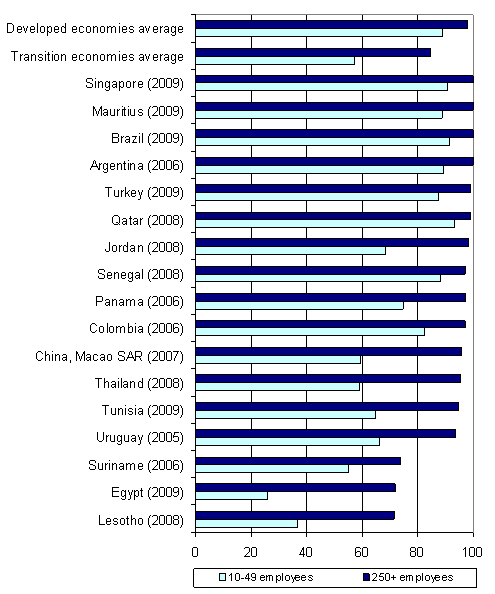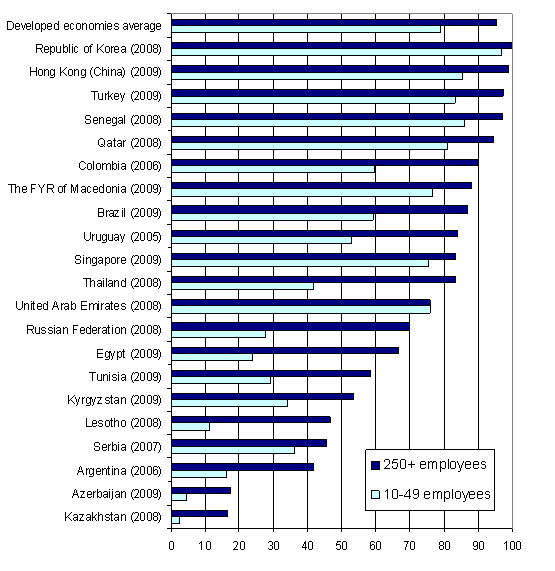| EMBARGO The contents of this press release and the related Report must not be quoted or summarized in the print, broadcast or electronic media before 19 October 2011,17:00 [GMT] (13:00 New York; 19:00 Geneva, 22:30 New Delhi, 02:00 - 20 October 2011 Tokyo) |
Geneva, 19 October 2011 - The Information Economy Report 2011: ICTs as an Enabler for Private Sector Development (1) emphasizes that governments should create environments for greater information and communication technologies (ICT) adoption for private sector development, by liberalizing markets to expand and improve network infrastructure, and providing legal and regulatory environment for electronic transactions. Special attention should be given to extending access to places where connectivity is lacking, such as rural areas of least developed countries (LDCs), and to building trust in the use of ICT.
Micro and small enterprises (MSEs) in developing economies remain far behind in terms of use of ICTs, according to the Information Economy Report. And even when access to ICTs is made available, small enterprises do not always apply them in their day-to-day activities, either because they are deemed too expensive or because they are not trusted.
For MSEs in developed countries, the use of computers and high-speed Internet has become common. This is far from being the case in most parts of the developing world, especially among smaller enterprises. Jordan is a good example, where virtually all enterprises with more than 250 employees are using the Internet for transactions, but only 6 per cent of the country´s micro-enterprises adopt the Web for sales and customer contact (Chart 1).
Computer and Internet use is critical for entrepreneurs to participate effectively in international value chains, yet less than one in five enterprises in sub-Saharan Africa has a website, compared with four of five in high-income countries.
For many enterprises in developing countries, the Internet is primarily used to send and receive e mails. By contrast, relatively few engage themselves in electronic commerce, and among those that do, it is more often used for placing than receiving orders. In general, it is easier for enterprises to purchase than to sell goods and services online, as the latter may involve creating or upgrading a Web presence and restructuring sales and inventory processes.
UNCTAD´s Report further shows that developing countries´ enterprises use the Internet mostly to obtain information rather than to conduct transactions with governments. Governments can improve access to relevant information and facilitate transaction services such as payment of taxes online, payment of utilities, and automate customs systems.
Broadband use still limited
According to the Information Economy Report 2011, high-speed Internet connections are essential to enable enterprises to make full use of Internet-based services and applications. One advantage is the possibility to use Voice over Internet Protocol (VoIP), such as Skype. This is of particular relevance for MSEs, as it is less expensive than traditional telephone services.
Broadband connectivity also allows for increased use of social media, which present huge economic and marketing opportunities for enterprises. Businesses are leveraging social media platforms - such as Facebook, Google+ and Twitter - to tap into their expanding user base. A large share of American and European MSEs already use blogs, forums, or wikis for internal or external purposes. Social media are increasingly used also by developing-country enterprises. For example, in Brazil, Indonesia, and the Bolivarian Republic of Venezuela, around one in five Internet users employs Twitter and other social media sites such as Orkut, says the Report.
Today, while around 90 per cent of small enterprises in developed economies benefit from high-speed Internet access, broadband usage is considerably lower in most developing countries (Chart 2). More than three quarters of medium-sized and large enterprises in Brazil, Colombia, Qatar, the Republic of Korea, Singapore, Turkey and the United Arab Emirates already enjoy broadband Internet access, but the corresponding share is much lower in other developing countries, especially in the case of small enterprises.
The Information Economy Report 2011 urges governments to seize the opportunities for private sector development that are emerging on the back of wider access to broadband as well as to facilitate improved access in places where relevant fixed or mobile broadband connectivity is still lacking. In order to speed up the roll-out of mobile broadband, countries need to allocate spectrum and license operators to provide the service.
The Information Economy Report and its database are available online at IER 2011 and http://Measuring-ict.unctad.org. |
ANNEX
Tables and figures
Chart 1. Enterprises using the Internet, by enterprise size, selected economies, latest year (%)
Source:UNCTAD, Information Economy Report 2011.
Chart 2. Enterprises using the Internet via fixed broadband, selected economies, latest year (%)
Source: UNCTAD, Information Economy Report 2011.


